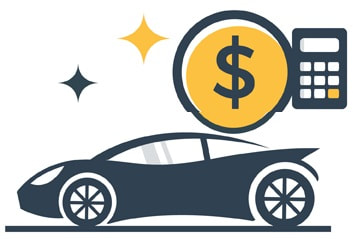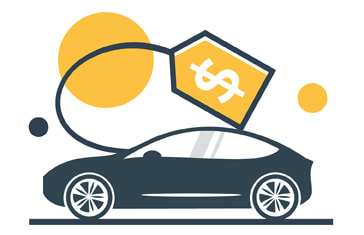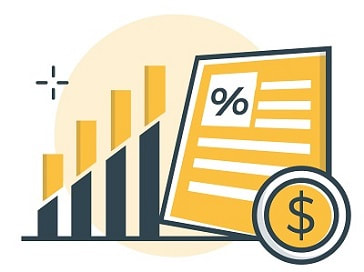The Real Costs of Owning a Car in New Zealand
If you're considering buying a car, it's important to understand the real costs of ownership beyond the upfront cost. Our guide explains upfront and ongoing costs and how to minimise car ownership costs.
Updated 28 February 2023
Summary
To help you understand the real costs of owning a car, our guide covers:
- A car is necessary for most working New Zealanders, especially in cities with suburbs far apart, such as Auckland. Unless you live in a city with a top-tier public transportation system (which arguably only Wellington would fall into), you're probably going to need a car if you're working or have a family.
- However, with the majority of cars on the road being non-electric (petrol or diesel) and the government's mandate to transition New Zealand to a cleaner, greener economy, fuel excise taxes and EV subsidies have meant more Kiwis are considering new car purchases.
- Many people thinking about buying a new car will assume that the car's price tag will be the bulk of the cost associated with driving. However, owning a car comes with many ongoing, hidden and longer-term costs above and beyond the initial purchase price.
- Know This: Some car-related costs are more obvious than others, but the easiest way to classify them is to separate them into fixed and variable costs. Fixed costs are those that don't change the more that you use your car. So you'll still pay these costs even if your car sits in your garage for the whole year. In contrast, variable costs will change depending on how much you use your car.
To help you understand the real costs of owning a car, our guide covers:
MoneyHub Founder Christopher Walsh shares his views on the costs of owning a car:
|
"I was inspired by a Reddit discussion where someone described cars as 'Anti-Wealth Builders'. The points made suggested someone living in Auckland, commuting by car every day, would spend around $5,000 to $10,000 a year on a car. When looking at that over ten years, it adds up to as much as $100,000. And remember, this is money you'll have to pay after tax, which makes it a significant percentage of average salaries around New Zealand".
"Specific costs incurred every year can include (for the typical driver) petrol (around $3,000), maintenance ($1,000), insurance ($1,000), parking ($500) and renewing a Warrant of Fitness and Registration ($300). Add in annual depreciation, which is almost unavoidable (and anything from $100 for an old car to $10,000+), and you have an expensive asset with high ongoing costs". "Private transport is arguably a huge money spinner in terms of taxes (petrol GST, road user charges, car sale GST, all the GST from car repairs, mechanic shops, retail shops for accessories etc.). Unfortunately, this means that car owners can't avoid the costs, although there are many ways to minimise them (as this guide outlines)". "The alternative is public transport, but for many people not already using it, taking a bus or train will add a significant amount of time to their journey and the lack of convenience. The costs of this time may be more than running a car. You'll likely need a car - the design of New Zealand's cities makes it that way. However, car dependency is a real poverty trap for many New Zealanders and can cost much more than you budget. For this reason it's essential to consider pushing the costs of car ownership down as much as you can". "The reality is a cheap reliable car is a proven way to save on what can be big costs. The biggest cost driver is car finance, which is often a burden for many drivers who get caught up in securing a high-spec car and paying a lot of interest over many years. I believe keeping life simple is the way to go - wealthy people tend to drive boring cars". |
Christopher Walsh
MoneyHub Founder |
What are the Main Fixed Costs that Come with Owning a Car?
Four main fixed costs come with owning a car:
- The car’s initial purchase price
- Car Insurance
- Car Financing
- Warrant of Fitness and Registration
1. Initial Purchase Price
- The first fixed cost you'll likely need to pay when considering car ownership is the initial purchase price you pay for the car.
- This purchase price is fixed as you'll only pay once when you get the car and won't have any ongoing costs associated with the purchase.
- The initial purchase price will vary drastically depending on your vehicle type and whether the vehicle is new or used.
- Make sure to determine what you can afford relative to your household income level, existing debt balances and current expenses - too often cars cause New Zealanders financial misery and pain for the long-term.
2.Car Financing or Lease Payments
- While not everyone borrows to buy a car, many households have some form of debt financing for their EV or petrol cars. Given the high price of newer cars, many New Zealanders have turned to car loans, especially during COVID-19, when interest rates were pushed to record lows and the lack of supply of cars forced prices up.
- For those not able to purchase a car outright, using car finance can be an affordable way to bridge the gap and get the vehicle you may need for family or work reasons. But it's essential to understand the additional costs and burdens associated with financing a car. The reality is it's too common for Kiwis to get snowed under with multiple debt burdens (mortgage debt, credit card debt, personal loan debt, car debt etc.) so make sure you ask whether the economics of car financing makes sense for you and your situation.
- With the Reserve Bank of New Zealand increasing the official cash rate sharply in the last few years to battle inflation, this has pushed interest rates on everything from mortgages to car loans which car finance loans around 8% to as high as 25%.
- You'll be paying more interest the longer your loan is for, increasing the ultimate cost of owning the car. This interest expense is one of the highest hidden costs to car ownership, so make sure you negotiate the lowest interest rate possible and choose shorter loan terms if you can handle the monthly repayments. The shorter the loan, the less your car will ultimately cost you.
More details: Car Finance
3. Insurance
- Insurance is one of the more significant fixed costs associated with owning a car. Insurance is a fixed cost because once you've bought a car insurance policy, you'll need to pay the same amount (or more) each year regardless of how much you drive or whether you drive the car.
- While your policy can be third party or fully comprehensive, the costs will vary based on your car, location, age, driving history and other factors such as the excess you choose.
- Comprehensive insurance policies cover you for most car-related incidents (including accidents, theft, fire, vandalism and storm damage, and any damage done to someone else's property or car). Third-party car insurance only covers unintentional damage to someone else's property or car.
- If you've only got third-party car insurance and get into an accident, the insurer will not cover the costs of repairing your car.
- If you’re taking out financing on a car purchase, it’s generally a condition of the car financing that you must take out comprehensive car insurance before they can approve the financing.
More details: Our guide to car insurance explains more.
4. Warrant of Fitness (WOF) and Registration (Rego)
- All vehicles on roads in New Zealand must be registered and have a valid Warrant of Fitness. Generally, WOF and registration fees will vary depending on the type of vehicle. Most of the time, a WOF and rego will need to be renewed each year, with some vehicles requiring a WOF being renewed more frequently due to the age of the vehicles.
- The cost of each WOF/rego will also change depending on the type of vehicle (such as diesel or electric), the quantity of CO2 it emits and whether it's used for personal or commercial use.
More details: Our guide to car registration costs guide explains more.
What are the Main Variable Costs that Come with Owning a Car?
Three main variable costs come with owning a car:
- Fuel
- Ongoing maintenance
- Unexpected repairs
1. Fuel (petrol or power)
- Fuel is one of the highest ongoing costs that Kiwis will have to pay weekly regarding owning a car.
- Because the cost per litre of petrol generally fluctuates depending on supply and demand factors (and the strength of the NZD as oil is bought in USD), how often and where you drive each year varies, it's difficult to accurately forecast how much money you'll need to spend on petrol each year. That said, it's reasonable to reduce the amount of petrol you use by choosing a more economical car or driving conservatively.
- For electric vehicles (EVs), the cost of running the car is significantly lower, given the relative cost of electricity (per kilowatt hour) versus petrol (kilometres per litre). This decreased cost is one of the biggest benefits of switching to an EV over continuing to run your petrol car.
2. Ongoing Maintenance
First, it's important to identify the difference between ongoing maintenance and repairs. Generally, maintenance is defined as routine fixes that every vehicle needs to stay on the road. Ongoing maintenance occurs gradually and is usually done when the car is still running (meaning you could theoretically still drive the car without making any changes). However, to maximise the life of your car, it's generally recommended to maintain it continually.
Ongoing maintenance includes things like:
Know This:
Ongoing maintenance includes things like:
- Oil changes
- Fluid top-offs
- Tire balancing and rotation
- Alignments
- Car washes (to maintain the paint on the car)
- Filter replacements
Know This:
- The "wear and tear" is something that every car owner experiences at one point or another. The more you use something, the more likely it is to break down and need to be maintained. Whether it's tyres, brake pads or windscreen wipers, the components of a car need to be maintained for them to continue functioning.
- Additionally, most road regulations (through WOF and regos) will require the car's parts to be at a minimum standard or will not pass these inspections.
- For example, changing car tyres every 40,000km - 50,000km is recommended. The cost of maintaining the various parts of the car will vary depending on the specifications, quality and type of car you have. So it's worth researching to find the best quality part from the most reliable supplier at the lowest price.
- The reason that ongoing maintenance is considered variable is that as you continue to use your car, you can expect more maintenance activities (like oil changes, car washes and filter replacements) to be required.
3. Unexpected Repairs
Unexpected repairs, on the other hand, are unplanned fixes to broken parts due to an accident or other incident that wasn't related to "wear and tear". Importantly, repairs focus on essential things that need to be fixed urgently and happen "acutely" rather than gradually (like ongoing maintenance). Repairs include things like:
Repairs are considered variable because as you continue to use your car, you can typically expect more repair costs to arise. However, out of all the variable costs listed above, unexpected repairs are the most difficult expense to predict.
- Leaky transmissions
- Falling suspension components
- Bad wiring and electronics
- Brake failure
Repairs are considered variable because as you continue to use your car, you can typically expect more repair costs to arise. However, out of all the variable costs listed above, unexpected repairs are the most difficult expense to predict.
When is the Best Time to Replace My Car?
Vehicles don't last forever, but replacing a car is often expensive and creates further monthly outgoings if you need to take finance. As a result, many New Zealanders ask whether they need to upgrade or downgrade their car every few years.
Below are some of the common situations to consider when thinking about replacing your car:
Below are some of the common situations to consider when thinking about replacing your car:
1. Lifestyle/family changes
The person you were when you first purchased your car is likely to be completely different to the person you are when you consider to change your car. For example, you might have been a university student and bought a small, cheap car that you used to get from A to B. Now, you may have a young family or spend more time commuting than going on road trips. Whatever the case, your car should change as your situation significantly changes.
A few examples of significant changes that could warrant changing your car include the following:
A few examples of significant changes that could warrant changing your car include the following:
- Larger families generally require larger vehicles that come with more seats.
- Larger motors are likely to be able to handle more off-road conditions.
- Newer model cars likely come with the most up-to-date safety and protection features, which are likely to be far more important to you and your family than it was when you were younger.
- As inflation bites and the cost of living increases, it may not be as economical to drive large gas-guzzling 4x4's that aren't fuel efficient and that you're only using to commute to work and back.
- Getting a new job with a longer commute requires a more reliable and fuel-efficient car.
2. Continued maintenance issues
Generally, as a car gets older, it requires more frequent maintenance. Over time, as cars age, the cost of maintaining a car can become unmanageable or cost too much each year relative to the carrying value of the car. If you notice that you're constantly taking your car in to get repaired, it could be a signal to change your car.
While newer cars are typically less likely to break down and need repairs, you're likely to pay a significant upfront cost. So kiwis will need to weigh whether they would rather pay a smaller fixed upfront cost for a used car and continually pay a higher variable cost through repairs or a high upfront cost with minimal variable costs through repairs.
While newer cars are typically less likely to break down and need repairs, you're likely to pay a significant upfront cost. So kiwis will need to weigh whether they would rather pay a smaller fixed upfront cost for a used car and continually pay a higher variable cost through repairs or a high upfront cost with minimal variable costs through repairs.
3. Fuel efficiency
Most modern cars are significantly more efficient than older cars on a kilometres per litre basis. Additionally, most EVs are now significantly cheaper to run compared to traditional internal combustion engines (ICEs), meaning it may make more economic sense to buy a new/EV version of the same car you have. You should be able to find many used hybrid and electric vehicles on marketplaces like Trade Me.
Fuel-efficient vehicles also have smaller carbon emissions footprints, which are better for the environment. However, note that fuel-efficient cars are generally more expensive compared to older ICE cars, although government subsidies exist.
Fuel-efficient vehicles also have smaller carbon emissions footprints, which are better for the environment. However, note that fuel-efficient cars are generally more expensive compared to older ICE cars, although government subsidies exist.
4. Budget constraints
If your finances have recently changed, your current vehicle may not fit your budget. For example, if you've recently been made redundant or have taken a lower-paying job and are struggling to meet your car payments, it can make sense to swap your car. In contrast, if you've been promoted and are making more money, you could likely justify upgrading your car to suit your needs.
Must-Know Facts about the Costs of Owning a Car
Shop around for the best car insurance deals.Some insurance groups are known for offering more cost-effective rates than others, so it's important to compare and contrast various insurance policies to get the best deal possible. For more information on car insurance, check our guide.
|
Refinance your car loan interest rate if possible.Some car loan providers can give better financing rates if you switch over to them; our guide to car loan refinance has more details. There are zero downsides to checking what other car loan providers are willing to lend you money, and with changes to interest rates, it's very common for car financing rates to fluctuate. Additionally, with interest rates continuing to rise, locking in car loan rates for longer can save you thousands.
|
Take your car in for servicing or a checkup BEFORE issues crop up.Regarding car repair costs, it's best to be proactive and maintain or take your car in for servicing before something breaks. Taking your car in for regular servicing reduces the cost of maintaining the car rather than replacing something broken. Routine checks can also detect issues that will likely come up later, meaning you can plan your finances and services around these issues. Having an emergency fund helps considerably with such expenses.
|
Be aware of the indirect factors that impact your car finances.While this guide has identified the most tangible costs, like fuel, registration and financing, other indirect costs also need to be factored in. For example, parking and depreciation can all impact owning your car; you can't use a car without a place to park it, and your car is likely to drop in price regardless of what you do to it, thanks to depreciation. Other factors that may additionally have an indirect cost include extended warranties (such as the dubious MBI, GAP and PPI), breakdown service subscriptions and road user charges.
Depreciation isn't a cost but something to remember if or when you eventually decide to sell your car. Generally, new cars lose their value much faster than older cars, so buying used cars and maintaining them can be one way to reduce the amount the car depreciates each year. |
Check your car insurance contract for exclusions that aren't included in the policy.Many Kiwis have purchased "fully comprehensive" insurance but rarely read the policy in detail. Make sure you fully understand which situations you are or aren't covered under your policy to ensure you aren't blindsided in the event of an incident or accident. Our guide to Car Insurance has more details.
|
If you've opted for car financing, go through the contract with a fine tooth comb.Take the time to review the financing contract as thoroughly as you can before signing it. Generally, car loan providers will include special provisions that either result in unexpected fees, variable interest rates or irregular payment cycles that can catch many people off guard.
Negotiate lower establishment or ongoing fees associated with your car financing. Most car loan providers will still do the deal and can negotiate on the margins, so it's important to ask if these exceptions are possible. The stronger your credit profile, the more room for negotiation. Remember that the shorter your loan period, the less interest you’re likely to pay. Our guide to Car Finance has more tips and facts. |
Frequently Asked Questions
Do used cars depreciate as rapidly as new cars?
New cars depreciate much more quickly than used cars. While all cars depreciate over time, new cars will lose value much faster simply because they start at a much higher cost and are no longer new. Generally, older cars have depreciated significantly, meaning there isn't much residual value left to lose.
Car finance rates are rocketing up. I can't afford my car payments. What can I do?
If you are struggling to make your car payments, the best advice is to contact your car loan provider and try to negotiate a better rate. If this doesn't work, you have the option to refinance with lenders who offer competitive rates.
If you're still unable to make things work and having a car is essential for your work or family life, you may have to consider downsizing your car or other elements of your budget that you can use to save money and ensure you can continue to meet your car payments. If you default on your car payments, the car loan provider has the legal right to repossess the car and likely charge additional fees associated with the default (which would be the worst-case scenario).
If you're still unable to make things work and having a car is essential for your work or family life, you may have to consider downsizing your car or other elements of your budget that you can use to save money and ensure you can continue to meet your car payments. If you default on your car payments, the car loan provider has the legal right to repossess the car and likely charge additional fees associated with the default (which would be the worst-case scenario).
How should I think about sunk costs related to car ownership?
It can be difficult to let go of a car you've had for years and have spent significant money repairing. However, try to frame your situation in light of the expected costs you'll likely incur in the future and what makes the most economic sense for your unique situation.
The time and money you've put into the car have served their purpose (to get you where you need to go safely and efficiently). However, this doesn't mean that putting additional time and money into the car is worth it.
The time and money you've put into the car have served their purpose (to get you where you need to go safely and efficiently). However, this doesn't mean that putting additional time and money into the car is worth it.
Why are used cars so expensive? Have they gone up in price recently? What about fuel?
TradeMe (one of the top online used car marketplaces) has stated in 2021 report that the median asking price for used motors has increased by around 35%. TradeMe has attributed this rise to the persistent COVID-19 lockdowns that have influenced supply (while in lockdown) and demand (with more people coming back into the workforce or upgrading to EVs).
However, the more significant factor for many Kiwis is the rise in fuel prices due to supply shocks, coupled with the fuel excise tax implemented by the New Zealand government. Over the last few years, fuel costs have rapidly increased which has made filling up a car incredibly expensive.
For top tips on reducing driving costs in the era of rising prices, check out our guide.
However, the more significant factor for many Kiwis is the rise in fuel prices due to supply shocks, coupled with the fuel excise tax implemented by the New Zealand government. Over the last few years, fuel costs have rapidly increased which has made filling up a car incredibly expensive.
For top tips on reducing driving costs in the era of rising prices, check out our guide.
I just bought a car from a dealership and am worried about getting ripped off. What protections do I have?
Any new and used cars sold at a registered dealership are covered by the Consumer Guarantees Act. If you run into any issues that weren’t previously disclosed before you purchased the car, then the seller is obligated to repair, replace, or refund you. However, this will depend on a case by case basis. For more information, check out the Consumer Guarantees Act's breakdown.
What are some of the benefits of changing my car?
There are a few benefits to changing cars:
- New cars are generally more fuel efficient than older cars.
- A hybrid or electric vehicle will be cheaper to run.
- A different car can match your needs better.
- Newer vehicles generally require less maintenance.
What are the drawbacks of changing my car?
- Buying a new car will likely require a lot of upfront costs, even if it reduces your variable costs in the longer term (like ongoing maintenance costs).
- Repairs on newer cars are generally more costly than on older cars.
- Depreciation on new cars is significantly higher than depreciation on older cars.
Related Guides:
Popular Comparisons
Popular Guides
Car Loan Insurance
Business Car Financing:
- How to Save Money Driving
- How to Save for a Car
- Best Car Finance
- EV Loans and Finance
- Car Finance Calculator
- Best Electric Cars Review
Popular Comparisons
- Personal Loan vs Car Loan - What is Better for Buying a Car?
- Car Dealership Finance vs Alternative Finance
Popular Guides
- Car Loans and Collateral
- Car Loan Guarantors
- Bad Credit Car Loans
- Balloon Payments
- How to Refinance Your Car Loan
- Simplify Loans Review
- Car Loan Refinance Calculator
Car Loan Insurance
- Mechanical Breakdown Insurance (MBI)
- Guaranteed Asset Protection Insurance (GAP)
- Payment Protection Insurance (PPI)
Business Car Financing:













